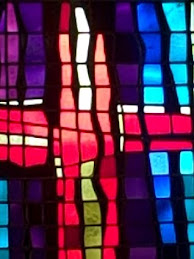Dear church members and friends of St. John's,
The sermon text this Sunday is from Matthew 5:21-37 and sports some "hard sayings" of Jesus such as "if your eye causes you to sin then pluck it out" because it's better to go through life with only one eye than to spend eternity burning in hell. Wow! Where did that one come from? I thought Jesus was a compassionate healer who is our best image of a loving God. This is the language of hyperbole akin to the compassionate parent who says to his children in the car on a trip: "If you don't be quiet I'm going to strap you to the hood of the car." Quietness comes even though the children know the father would never do that to them.
But we are talking about hell here and we are talking about the Bible. For some of us the question of hell is an emotional issue due to brash sermons on that topic we heard in our formative years. Today I discovered a book called
Good Goats: Healing Our Image of God by Dennis Linn
.
The author, named Dennis, tells how he once presented some of the ideas from his book to a group of elderly retired Roman Catholic nuns. One sister raised her hand and said: "But what about the story of the sheep and the goats? It says right there that the sheep go to heaven and the goats go to hell."
Dennis then asked how many in the group had done what Jesus talked about in that passage and fed a hungry person, clothed a naked person, or visited a person in prison? All the sister raised their hands. Dennis said: "That's wonderful! You're all sheep." Then he asked, "How many of you, even once in your life, have walked by a hungry person, failed to clothe a naked person, or not visited someone in prison?" Slowly, all the sisters raised their hands. Dennis said, "That's too bad. You're all goats."
The sisters looked worried and perplexed. Then suddenly one very old sister's hand shot up. She blurted out, "I get it! We're all good goats!"
I love Dennis's commentary on page 49 at this point. He says,
"That sister did get it. She understood that language about heaven and hell is symbolic language. Heaven and hell are not specific geographical places. They are symbols of inner realities, of states of being. All of us who have felt alienated, unloved, overwhelmed by shame or helplessly caught in an addiction know what it's like to be in hell. And all of us who have been welcomed home, who have seen our goodness reflected in the affirming eyes of another or who have been loved into recovery know what it's like to be in heaven. We all have wheat and weeds within us, sheep and goats. The kingdom of God is within us, and we're all good goats."
Throughout the book the authors - Dennis and his children - do a remarkable job of addressing serious theological themes in the format of what appears to be a book for older children. I think each of us is a child at heart so this book is for all of us. Too many adult Christians still harbor the childish image of God as the Great White Grandfather in the Sky who sends some people to hell when they die and lets others enter the joys of heaven.
We do well to remember that ALL language about God is symbolic. Human words can never clearly convey all the truth there is to know about God. In the end, a healthy reading of the Bible that takes seriously the symbolic language it employs about God may end up falling back on a song some of us learned in the nursery of our church when we were knee high to a grasshopper. That song conveys the gist of what the Bible wants to say about God and puts it in the form of a catchy tune: "Yes, Jesus loves me. Yes, Jesus loves me. Yes, Jesus loves me. The Bible tells me so." Jesus here represents God.
Peace of Christ be with you,
Pastor Jon
--
St. John's Presbyterian Church
5020 West Bellfort / Houston, TX 77035
T. 713.723.6262 / F. 713.723-4015 / Email: office.sjpc@gmail.com
Worship Service: Sunday, 10:30 am / Sunday School: 9:00 am

St. John's Epistle for February 10, 2011


